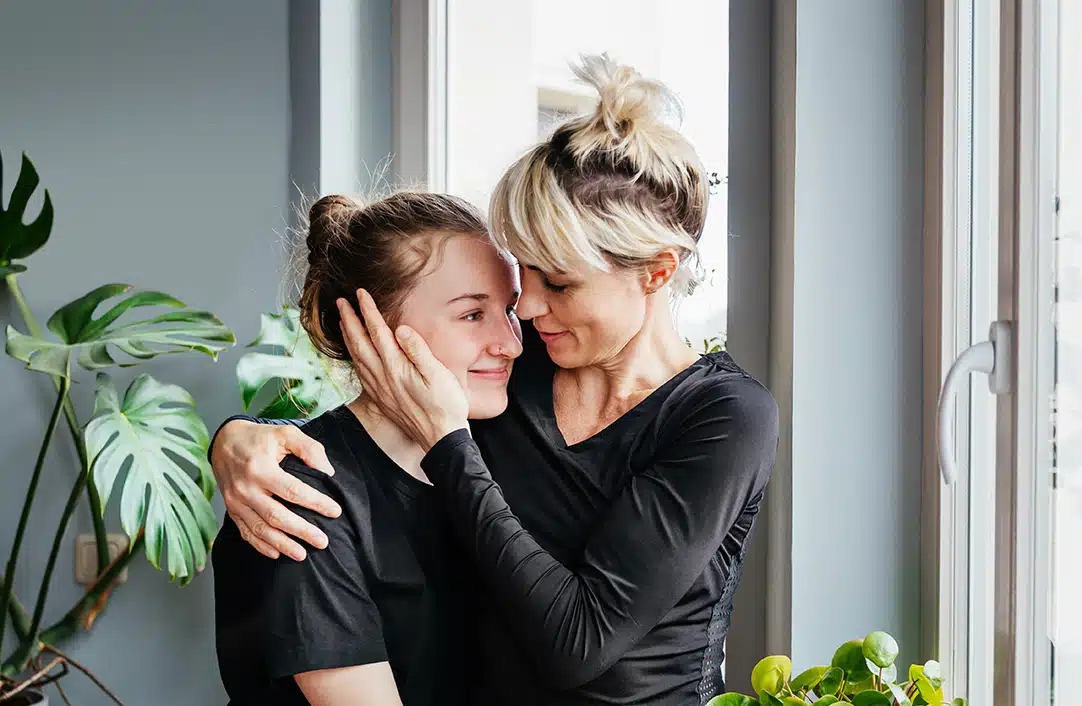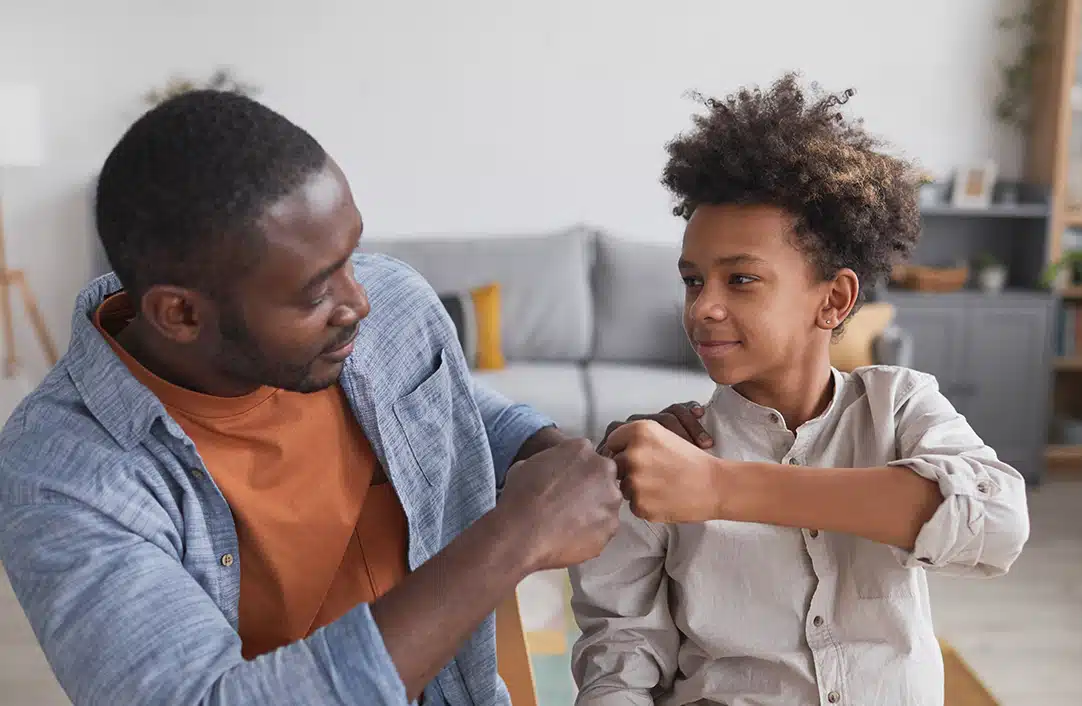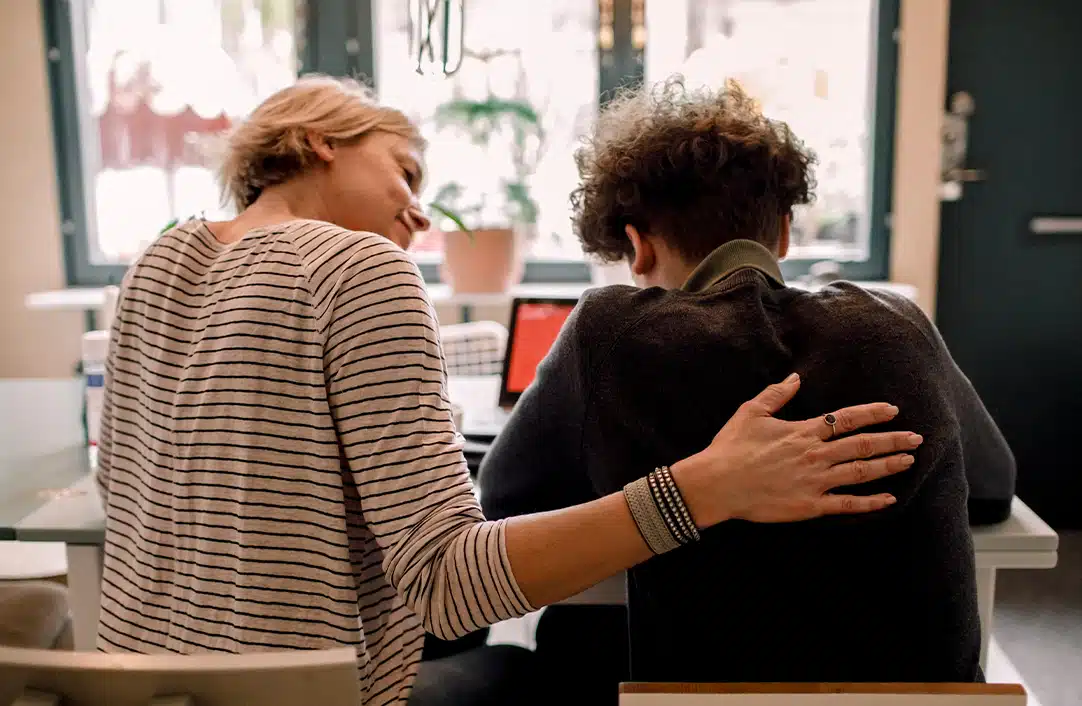Saprea > Online Prevention Resources > Prevention Resources: Monitor

Monitoring helps teach your child to interact with people and environments in ways that don’t detract from their safety. Rather than following their every move or trying to catch them doing something wrong, here are some ways to monitor your child to help reduce the risk of sexual abuse.
We recommend that you Monitor:
Who Your Child Spends Time With
Risk factors
How Well Do I Know the People Who Spend Time with My Child?
01
Know Your Child’s Contacts
- Keep track of who your child interacts with, both online and offline.
- When your child is spending time outside of your home, ask questions to learn who else will be present.
- Inquire about background checks for coaches, instructors, group leaders, and other mentors who work with your child.
- Update this inventory as your child engages in new groups, activities, and interests.
02
Communicate Boundaries
- Clearly communicate your expectations for boundaries regarding contact with your child. Here are some examples:
- "Make sure to loop me in/include me on all text, email, or other communications you have with my child."
- "If you want to drive our child home from soccer practice, call to ask us first so we can get more details, including who else will be in the car."
- Initiate a conversation with anyone who crosses a boundary with your child or demonstrates behavior that is concerning to you.
- Invite people in your child’s life to take an active role in keeping your child safe from child sexual abuse.
03
Talk with Your Child
- Ask open-ended questions about your child’s day, including who they spent time with, how that time was spent, and how they feel about that person.
- Encourage your child to tell you about anything that might’ve made them feel weird, worried, or uncomfortable, and include reassurances they won’t get in trouble for what they share.
- Make it clear to your child that no one should ask them to keep secrets from you, especially secrets involving guilt or fear.
- Remind your child often that you will love and support them no matter what.
04
Supervise
- Communicate with individuals who will be supervising activities your child will be involved in.
- Check in periodically on your child’s internet activity and digital communications.
- Minimize your child’s unnecessary one-on-one time with others.
- Help your child understand why it’s important for you to know where they’ll be, who will be there, when they’ll be home, and other information you may need.
How Are My Child’s Vulnerabilities Risk Factors?
Which Groups Experience Higher Risk?
Children with Low-Self-Esteem
Children in a Stressful Home Environment
Children with low self-confidence in their surroundings, particularly at home, are more vulnerable to an adult who promises stability and security, even if the stability comes with other unwanted behaviors. This is especially the case for children whose homelife is characterized by high levels of marital conflict, low parent-child bonding, parents with alcohol or substance abuse problems, and various forms of abuse, neglect, and maltreatment.4 Children with a stressful home life may also feel that they cannot confide in a parent because the parent is already burdened with so many problems and may not respond well.
If you can relate to any of the above, please know that there are programs and services that can provide you and your family with the support needed to adjust your current path.
Children with Disabilities
Children Who Identify as LGBTQ+
Children in Blended Families
Children Who Experience Loneliness
How Can High-Risk Behaviors Affect My Child’s Vulnerability?
Alcohol and/or substance use
Risky sexual interactions
While these behaviors and the risks they pose can feel alarming, it’s helpful to remember that neither you nor your child are perfect, and that many of these behaviors may be a youth’s means of trying to cope with or regulate painful emotions.
The good news is that no one cares more about your child than you do. Your ability to recognize what may place them at risk—and the support you can offer to mitigate that risk—can make all the difference in a child’s safety. Trust your gut as you assess your child’s needs. And remember that what’s most important is to be there for your child, let them know how much you love them, and keep being the amazing parent that you are.
What Is Grooming?
Grooming involves specific behaviors that are intended to prime a child for sexual abuse. Often, individuals who attempt these behaviors are already known to the family and a part of the child’s life. They may be an acquaintance, a trusted family friend, a neighbor, a babysitter, or even a relative. They may be someone the family knows through an organization or youth activity, such as a church leader, a music instructor, a soccer coach, a camp counselor, or a school teacher.
Whatever role the individual already has in a child’s life, they will oftentimes employ grooming behaviors to gain further access to the child. This may also involve grooming—or gaining trust from—the child’s family, neighbors, and other adults who may, in the groomer’s mind, pose a barrier to getting close to the child. To this end, groomers may present themselves as charming, charismatic, reliable, and trustworthy. In some instances, like in religious organizations, sports programs, or other institutions with hierarchies, they may hold titles or authorities that place them in a position of power and respect within the community.
While it's not always easy to identify a potential perpetrator, there are specific tactics that a perpertrator will use to groom a child.
What Are Signs of Grooming?
Below are some common grooming tactics that parents can keep an eye out for:
01
Gaining the Child’s Trust
Building trust is a foundational part of any relationship, including relationships between children and adults who provide positive mentorship and support. The difference between a caring, well-meaning adult and a potential perpetrator is that a perpetrator will use trust as a means of getting close to and eventually isolating the child. Perpetrators may seek to earn a child’s trust by building a friendly rapport, singling the child out as “special,” and showing interest in the child’s hobbies, passions, and pursuits.
They may ask a lot of questions about the child’s life, including questions about their family, friends, and daily routine. The perpetrator may also treat the child as a trusted confidante, sharing secrets, vulnerabilities, or concerns with the child, then encourage the child to do the same in return. They may use statements like “I’ve never told anyone that before,” or “I feel like I can tell you anything.”
During this stage, a perpetrator is also assessing risk and identifying any vulnerabilities they can exploit. For instance, if a perpetrator realizes that a child is feeling marginalized or alienated, they may offer assurances of love, acceptance, and understanding.
02
Communicating Secretly
Because secrecy is key to grooming a child for sexual abuse, groomers will seek out and initiate ways to communicate with a child privately. Oftentimes they will communicate with a child online, perhaps through a child’s email, text messages, or social media platform. They may gift the child with a cellphone or another internet device. Such devices not only increase the groomer’s access to the child but also provide more opportunities and methods to groom via texts, calls, exchanged photos and videos, etc. These online channels of communication will often coincide with or help facilitate in-person interactions between the groomer and the child. Whatever modes of communication are used, a groomer will repeatedly encourage the child to keep their interactions “just between us” or “our little secret.”
03
Offering Gifts, Bribes, and Flattery
Gifts and bribes may be used by the adult as a means of “proving” their affection and making the child feel special. These grand gestures often facilitate or escalate the grooming process (such as the secret cellphone mentioned above) and/or to pressure the child to do certain things as a show of gratitude for the adult’s generosity. For instance, after buying a child an expensive webcam, the adult may then tell the child to put their new gift to good use by stripping or performing other sexual acts in front of it. In response, the child may feel a sense of obligation, indebtedness, or fear of the gift being taken away.
Gifts can also be used to drive a wedge between the child and their parents, especially if the gifts are expensive or deemed something “your parents would never get you.” A groomer might also warn that the child’s gifts will be taken away by the parents “if they ever found out about us.”
Flattery, like gifts and bribes, can be employed to make the child feel valued, appreciated, and desired. It may begin with compliments about the child’s talents, personality, or intellect, before becoming more targeted and sexualized. Flattery may also be the groomer’s gateway attempt to make the child “feel good” before easing the victim into more physical and sexual situations.
04
Testing Boundaries
Grooming is often a gradual, subtle, and methodical process that escalates over time— particularly once trust is established. This means perpetrators are unlikely to initiate sexual contact with a child right away. Rather, they’ll ease into sexual behaviors slowly, testing the child’s boundaries to assess risk and gauge the child’s comfort levels.
This might involve telling an off-color joke or making sexualized comments to see how the child responds. It may involve sitting the child in their lap or initiating other forms of seemingly harmless touch, like tickling, wrestling, or snuggling, that eventually escalate into more inappropriate gestures, like petting, fondling, or groping. The groomer may try to play sexualized games with the child, such as truth-or-dare, “pantsing,” or strip games. They may test the child’s sense of privacy by entering their bedroom or bathroom, perhaps offering to help them change, bathe, or complete another task that the child would typically do alone. Groomers can also test boundaries via online communications, such as texting a sexualized emoji, joke, or gif and then encouraging the child to do the same.
05
Sharing Sexually Explicit Material
Sexual material may start as lewd jokes, comments, and innuendos that, over time, become more graphic and detailed. The perpetrator may start using sexual terms more frequently around the child or shift conversations toward sexual topics. As with the other grooming tactics listed, the sharing of sexually explicit material is often facilitated through a perpetrator’s online access to the child.
They may send the child sexualized pictures, photos, or messages found online; they may start texting intimate photos or videos of themselves (what is known as sexting), and then ask the child for a photo in return. In doing so, the perpetrator is not only trying to normalize sex and accelerate the grooming process but to further distance the child from their parents. They may emphasize to the child that their parents would never approve of the material they’ve seen and would likely punish the child if they ever found out. The shared sexual content can become yet another secret that incentivizes the child to keep quiet.
Whatever the content is and however it’s shared, it’s important to note that exposing a child to any sexually explicit material is a form of child sexual abuse. For more information about non-contact forms of abuse, visit our Understand the Issue of Child Sexual Abuse page.
06
Isolating the Child
07
Employing Shame and Threats
Groomers use a variety of tactics to prevent the child from seeking help and/or telling someone about the abuse. These tactics can range from shame (“Your parents would be so disgusted if they ever found out”) to threats of harm or embarrassment (“I’ll tell everyone how much you enjoyed it”). The adult may ease into such tactics by first blaming the child for something small and then gauging how the child responds. For instance, they may test out if the child pushes back or tells an adult, rather than taking the blame.
Over time, these smaller moments of guilt can progress into threats and intimidation that increase the child’s sense of powerlessness, fear, and shame. The adult may use threats such as, “No one will believe you,” or “No one will care.” They may threaten physical harm—whether to the child or to someone the child loves.
Other threats may include denying the child further affection and comfort—particularly if the child has come to see the perpetrator as their only source of support—or the threat of punishment from parents if the child were to confide in them. The perpetrator may also threaten to reveal a secret the child has shared with them or threaten to tell the parents about the child’s alcohol and/or drug use (even if such substances were offered by the perpetrator as a grooming tactic). Whatever the threat may be, the perpetrator’s purpose remains the same: to make the child feel like they can’t seek help.
As you become more informed about common grooming tactics perpetrators use, you can more easily identify when something doesn’t seem right. Trust your gut; if you notice a red flag, investigate the situation further.
Online Predators and Their Tactics
To better understand the risks children face online, it’s helpful to learn some of the biggest myths surrounding online predators.
Myth #1—Online Grooming Is Entirely Different from In-Person Grooming
Typically, online perpetrators will use many of the same grooming tactics as listed in the section above. Just as with in-person grooming, an online predator seeks to form a relationship by building rapport, gathering information, and identifying the victim’s vulnerabilities. They will then attempt to isolate the child, fostering a sense of secrecy between themselves and the victim.10
During the sexual stage, the offender will begin bringing sexual topics and behaviors into the conversation, oftentimes introducing sexually explicit material to push the child’s boundaries. They may also try to lower the child’s inhibitions by offering flattery, expressing similar interests as the child, showing sympathy towards the child’s concerns, asking about the child’s sexual experience, and expressing affection or admiration for the child. Some perpetrators may skip right to the sexual stage, introducing sexual topics early in the conversation or complimenting the victim’s physical appearance and sexual attractiveness. Whatever tactics are used, the intent remains the same: to isolate and coerce the child into sexual situations.
Myth #2—All Online Predators Want to Have Sex with Their Targets Offline
Myth #3—Online Predators Are Strangers the Child Meets Online
When picturing an online predator, it’s easy to think of a stranger lurking over a keyboard in a dark and distant basement. However, most adults who sexually abuse online aren’t strangers to the child. Rather, they are people the child already knows, such as a neighbor, a family friend, a teacher, a religious leader, or anyone else the child may have real-world connections to. In fact, in over half of reported cases of online child sexual abuse, the perpetrator was either an acquaintance to the child or a member of the child’s family.12
Oftentimes, sexual abuse that is occurring online is happening in conjunction with abuse taking place offline. The perpetrator may have initially reached out to the child online to eventually ease them into in-person interactions. Or they may use online communications to escalate grooming that has already begun offline. Regardless of how a perpetrator first contacts the child, odds are they will try to integrate technology into the grooming process at some point. This is because a perpetrator has more access to the child online and can more easily carry on interactions with the child in secret while avoiding the attention of parents and caregivers.
Ultimately, it’s helpful for parents to remember the following:
- Grooming tactics used online are like those used offline.
- Online sexual offenders can abuse a child without ever meeting them in person.
- Online sexual abuse is often perpetrated by someone the child already knows.
- Online sexual abuse often occurs in tandem with offline abuse.
How Can I Keep My Child Safe Online?
Below are a few strategies you can use to help your kids use technology responsibly and protect them from risks:
Set and Model Boundaries
Educate Children About Digital Citizenship
Use Filters as Tools, Not an End-All Solution
Foster Open Communication
Be in the Know About Your Child’s Internet Habits
Give Kids a Say
Offer Care and Support
Continue Learning How to Prevent Child Sexual Abuse

Educate

Support
